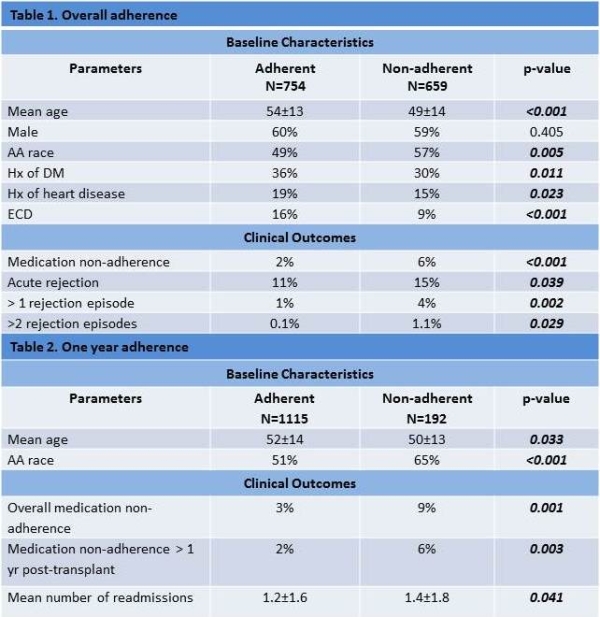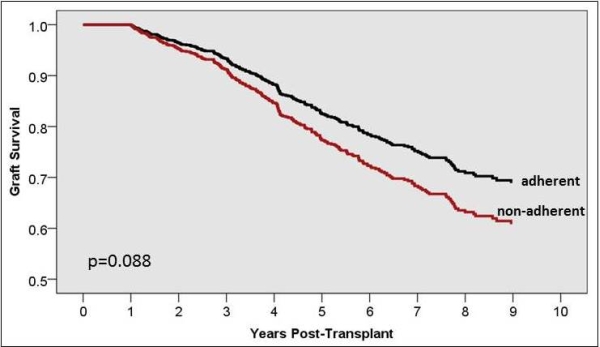Non-adherence to Appointments Is a Strong Predictor of Medication Non-Adherence and Outcomes in Kidney Transplant Recipients.
Medical University of South Carolina, Charleston, SC.
Meeting: 2016 American Transplant Congress
Abstract number: B53
Keywords: Graft survival, Kidney transplantation
Session Information
Session Name: Poster Session B: Disparities in Access and Outcomes
Session Type: Poster Session
Date: Sunday, June 12, 2016
Session Time: 6:00pm-7:00pm
 Presentation Time: 6:00pm-7:00pm
Presentation Time: 6:00pm-7:00pm
Location: Halls C&D
Disparities in healthcare access and non-adherence are important aspects of transplantation that affect outcomes. This study aims to investigate the impact of non-adherence to laboratory and clinic appointments on medication non-adherence and outcomes in kidney transplant (KTX) recipients.
Methods: We analyzed KTX recipients between 2005-14 with a detailed review of the medical records for non-adherence to laboratory and clinic appointments, as well as medication regimens. Baseline characteristics and clinical outcomes were compared between adherent and non-adherent groups.
Results: 1,413 KTX recipients were included: 754 adherent and 659 non-adherent. Non-adherent recipients tend to be younger, African American, and have private insurance. Adherent patients tend to have a history of DM, heart disease, and receive an ECD kidney. Non-adherence to appointments was a strong predictor of medication non-adherence (OR 3.1), acute rejection (OR 1.4), and subsequent rejection episodes (OR 3.3 and 8.1 respectively for > 1 and > 2 rejection episodes) (Table 1). Subset analysis of patients who had early non-adherence within 1 year post-transplant showed predominance of younger, African American patients. The same patients had higher prevalence of medication non-compliance, overall and > 1 year post-transplant, and mean number of readmissions (Table 2).

Kaplan-Meier analysis showed a trend towards lower graft survival in this group (Fig. 1).

Conclusion: Early non-adherence to laboratory and clinic appointments is a strong predictor of late medication non-adherence, acute rejection, and graft loss. Targeting patients that demonstrate early non-adherence to appointments with focused interventions may help improve kidney transplant outcomes in this high risk group.
CITATION INFORMATION: Posadas Salas M, Pullalarevu R, Kamel M, Chokkalingam A, Browning R, Kadri B, Salazar M, Srinivas T, Taber D. Non-adherence to Appointments Is a Strong Predictor of Medication Non-Adherence and Outcomes in Kidney Transplant Recipients. Am J Transplant. 2016;16 (suppl 3).
To cite this abstract in AMA style:
Salas MPosadas, Pullalarevu R, Kamel M, Chokkalingam A, Browning R, Kadri B, Salazar M, Srinivas T, Taber D. Non-adherence to Appointments Is a Strong Predictor of Medication Non-Adherence and Outcomes in Kidney Transplant Recipients. [abstract]. Am J Transplant. 2016; 16 (suppl 3). https://atcmeetingabstracts.com/abstract/non-adherence-to-appointments-is-a-strong-predictor-of-medication-non-adherence-and-outcomes-in-kidney-transplant-recipients/. Accessed March 5, 2026.« Back to 2016 American Transplant Congress
